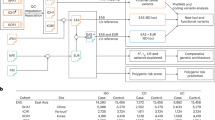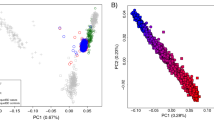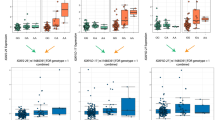Abstract
The transcription factor glioma-associated oncogene homolog 1 (GLI1) has a central function in gastrointestinal tract development and homeostasis. A non-synonymous single-nucleotide polymorphism (SNP) (rs2228226; Q1100E) in GLI1, which impairs GLI1 function in vitro, has been proposed as a risk factor for inflammatory bowel disease (IBD). In this study, we assessed the cumulative evidence for association of GLI1 with IBD. New genotype data for rs2228226 from New Zealand (907 controls, 990 IBD patients) and Belgian Caucasian case–control data sets (312 controls, 1214 IBD patients) were combined with data from the National Institute of Diabetes and Digestive and Kidney Diseases and three previously studied Caucasian case–control data sets. Meta-analysis of rs2228226 did not detect any association with ulcerative colitis (UC) (P=0.09, odds ratio (OR)=1.07, 95% confidence interval (CI)=0.92–1.24), Crohn's disease (CD) (P=0.29, OR=1.06, 95% CI=0.93–1.21) or overall IBD (P=0.15, OR=1.05, 95% CI=0.92–1.19). Our analyses of rs2228226 suggest that GLI1 is not a significant risk factor for IBD in Caucasians.
This is a preview of subscription content, access via your institution
Access options
Subscribe to this journal
Receive 6 digital issues and online access to articles
$119.00 per year
only $19.83 per issue
Buy this article
- Purchase on Springer Link
- Instant access to full article PDF
Prices may be subject to local taxes which are calculated during checkout

Similar content being viewed by others
References
Farrell RJ, Peppercorn MA . Ulcerative colitis. Lancet 2002; 359: 331–340.
Lees CW, Zacharias WJ, Tremelling M, Noble CL, Nimmo ER, Tenesa A et al. Analysis of germline GLI1 variation implicates hedgehog signalling in the regulation of intestinal inflammatory pathways. PLoS Med 2008; 5: e239.
Satsangi J, Parkes M, Louis E, Hashimoto L, Kato N, Welsh K et al. Two stage genome-wide search in inflammatory bowel disease provides evidence for susceptibility loci on chromosomes 3, 7 and 12. Nat Genet 1996; 14: 199–202.
Kinzler KW, Ruppert JM, Bigner SH, Vogelstein B . The GLI gene is a member of the Kruppel family of zinc finger proteins. Nature 1988; 332: 371–374.
El Andaloussi A, Graves S, Meng F, Mandal M, Mashayekhi M, Aifantis I . Hedgehog signaling controls thymocyte progenitor homeostasis and differentiation in the thymus. Nat Immunol 2006; 7: 418–426.
Lowrey JA, Stewart GA, Lindey S, Hoyne GF, Dallman MJ, Howie SE et al. Sonic hedgehog promotes cell cycle progression in activated peripheral CD4(+) T lymphocytes. J Immunol 2002; 169: 1869–1875.
Varas A, Hernandez-Lopez C, Valencia J, Mattavelli S, Martinez VG, Hidalgo L et al. Survival and function of human thymic dendritic cells are dependent on autocrine Hedgehog signaling. J Leukoc Biol 2008; 83: 1476–1483.
Kasperczyk H, Baumann B, Debatin KM, Fulda S . Characterization of sonic hedgehog as a novel NF-{kappa}B target gene that promotes NF-{kappa}B-mediated apoptosis resistance and tumor growth in vivo. FASEB J 2009; 23: 21–23.
Gearry RB, Roberts RL, Frampton CM, Burt MJ, Collett JA, Chapman BA et al. From Vienna to Montreal: the impact of changes in IBD classification on CARD15 genotype-phenotype relationships in a population-based cohort. Gastroenterology 2006; 130: T1979.
Weersma RK, Stokkers PC, Cleynen I, Wolfkamp SC, Henckaerts L, Schreiber S et al. Confirmation of multiple Crohn's disease susceptibility loci in a large Dutch-Belgian cohort. Am J Gastroenterol 2009; 104: 630–638.
Wellcome Trust Case Control Consortium. Genome-wide association study of 14,000 cases of seven common diseases and 3,000 shared controls. Nature 2007; 447: 661–678.
Roberts RL, Gearry RB, Hollis-Moffatt JE, Miller AL, Reid J, Abkevich V et al. IL23R R381Q and ATG16L1 T300A are strongly associated with Crohn's disease in a study of New Zealand Caucasians with inflammatory bowel disease. Am J Gastroenterol 2007; 102: 2754–2761.
Rioux JD, Xavier RJ, Taylor KD, Silverberg MS, Goyette P, Huett A et al. Genome-wide association study identifies new susceptibility loci for Crohn disease and implicates autophagy in disease pathogenesis. Nat Genet 2007; 39: 596–604.
Parkes M, Barrett JC, Prescott NJ, Tremelling M, Anderson CA, Fisher SA et al. Sequence variants in the autophagy gene IRGM and multiple other replicating loci contribute to Crohn's disease susceptibility. Nat Genet 2007; 39: 830–832.
Roberts RL, Hollis-Moffatt JE, Gearry RB, Kennedy MA, Barclay ML, Merriman TR . Confirmation of association of IRGM and NCF4 with ileal Crohn's disease in a population-based cohort. Genes Immun 2008; 9: 561–565.
McCarroll SA, Huett A, Kuballa P, Chilewski SD, Landry A, Goyette P et al. Deletion polymorphism upstream of IRGM associated with altered IRGM expression and Crohn's disease. Nat Genet 2008; 40: 1107–1112.
Duerr RH, Taylor KD, Brant SR, Rioux JD, Silverberg MS, Daly MJ et al. A Genome-wide association study identifies IL23R as an inflammatory bowel disease gene. Science 2006; 314: 1461–1463.
Noble CL, Abbas AR, Cornelius J, Lees CW, Ho GT, Toy K et al. Regional variation in gene expression in the healthy colon is dysregulated in ulcerative colitis. Gut 2008; 57: 1398–1405.
Barrett JC, Hansoul S, Nicolae DL, Cho JH, Duerr RH, Rioux JD et al. Genome-wide association defines more than 30 distinct susceptibility loci for Crohn's disease. Nat Genet 2008; 40: 955–962.
Fisher SA, Tremelling M, Anderson CA, Gwilliam R, Bumpstead S, Prescott NJ et al. Genetic determinants of ulcerative colitis include the ECM1 locus and five loci implicated in Crohn's disease. Nat Genet 2008; 40: 710–712.
Silverberg MS, Cho JH, Rioux JD, McGovern DPB, Wu J, Annese V et al. Ulcerative colitis—risk loci on chromosomes 1p36 and 12q15 found by genome-wide association study. Nat Genet 2009; 41: 216–220.
Gearry RB, Roberts RL, Burt MJ, Frampton CM, Chapman BA, Collett JA et al. Effect of inflammatory bowel disease classification changes on NOD2 genotype-phenotype associations in a population-based cohort. Inflamm Bowel Dis 2007; 13: 1220–1227.
Friedrichs F, Henckaerts L, Vermeire S, Kucharzik T, Seehafer T, Moller-Krull M et al. The Crohn's disease susceptibility gene DLG5 as a member of the CARD interaction network. J Mol Med 2008; 86: 423–432.
Lahiri DK, Nurnberger Jr JI . A rapid non-enzymatic method for the preparation of HMW DNA from blood for RFLP studies. Nucleic Acids Res 1991; 19: 5444.
Ciulla TA, Sklar RM, Hauser SL . A simple method for DNA purification from peripheral blood. Anal Biochem 1988; 174: 485–488.
Marchini J, Howie B, Myers S, McVean G, Donnelly P . A new multipoint method for genome-wide association studies by imputation of genotypes. Nat Genet 2007; 39: 906–913.
Acknowledgements
We thank the people of Canterbury with IBD who generously gave of their time to take part in the study. We also thank Rhondda Brown and Judy Hoar for their assistance in coordinating the recruitment of patients to the Canterbury IBD cohort; Pip Shirley, Meagan Reilley, David Tan, Ramez Ailabouni and Charlotte Duncan for entering patient details into the clinical database. This work was supported by the Health Research Council (HRC) of New Zealand (NZ), the University of Otago (NZ) and Lottery Health Board (NZ). RLR is the recipient of a Sir Charles Hercus Health Research Fellowship (HRC).
Author information
Authors and Affiliations
Corresponding author
Ethics declarations
Competing interests
The authors declare no conflict of interest.
Rights and permissions
About this article
Cite this article
Bentley, R., Cleynen, I., Gearry, R. et al. Evidence that glioma-associated oncogene homolog 1 is not a universal risk gene for inflammatory bowel disease in Caucasians. Genes Immun 11, 509–514 (2010). https://doi.org/10.1038/gene.2010.15
Received:
Revised:
Accepted:
Published:
Issue Date:
DOI: https://doi.org/10.1038/gene.2010.15



